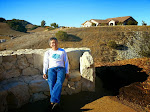About 7000 mathematicians gathered in Boston for the 2012 Joint Mathematics Meeting January 4-7, 2012.
My first event was the Mathematics Digital Library advisory board meeting. One of MathDL director Lang Moore's items was that the MathDL's Course Communities now include Developmental Math. These resources are from the Knowledge Exchange Networks spearheaded by Tom Carey of U. Toronto, San Diego State U., and the Carnegie Foundation for the Advancement of Teaching.
Haynes Miller (MIT) reported on MIT's online resource for faculty collaboration. First developed as an in-house tool to help facilitate writing across the curriculum, the resource is now being opened up for faculty collaborations throughout the US.
The CRAFTY (Curriculum Renewal Across the First Two Years) committee sponsored a contributed papers session on preparing students for calculus, and the College Board/MAA Committee on Mutual Concerns sponsored a panel session on promoting student success in calculus. Alison Ahlgren of U. Illinois and Marilyn Carlson of Arizona State University painted vastly different pictures.
Alison believes the UI has found a working solution using ALEKS (Assessent and LEarning in Knowledge Spaces) as both an assessment and placement tool. All UI students receive ALEKS assessment, and ALEKS placement scores are strictly enforced--even students who pass the UI precalculus course must earn the appropriate ALEKS score to be eligible to enroll in calculus.
Alison has data from many thousands of students on what ALEKS tests. Analysis of what topics were or were not mastered by successful vs unsuccessful students informs UI about what precalculus topics should receive greater of less emphasis. For example, UI students all appear to have mastered polynomials, but the great majority of pre-calculus students have little mastery of exponential functions and logarithms.
In contrast, Marilyn argues that ALEKS and other currently popular assessment systems do not measure conceptual understanding, and hence student success with ALEKS does not necessarily facilitate mastery of what we really want our students to learn. Marilyn led the development of ASU's Precalculus Concept Assessment.
The Committee for Two-Year Colleges sponsored a panel session on math for non-STEM students. Panelists Bernadine Chuck Fong and Jane Muhich of the Carnegie Foundation spoke about the philosophical and research-based underpinnings of the Statway™ and Quantway™ projects, while Larry Gray of U. Minnesota spoke on his reaction to the actual Statway™ lessons which he has reviewed. The audience included Mary Parker of Austin Community College and Katherine Yoshiwara of Los Angeles Pierce College, both faculty teaching Statway™ this year, and both speaking in favor of the project but indicating that there is still much work to be done.


No comments:
Post a Comment